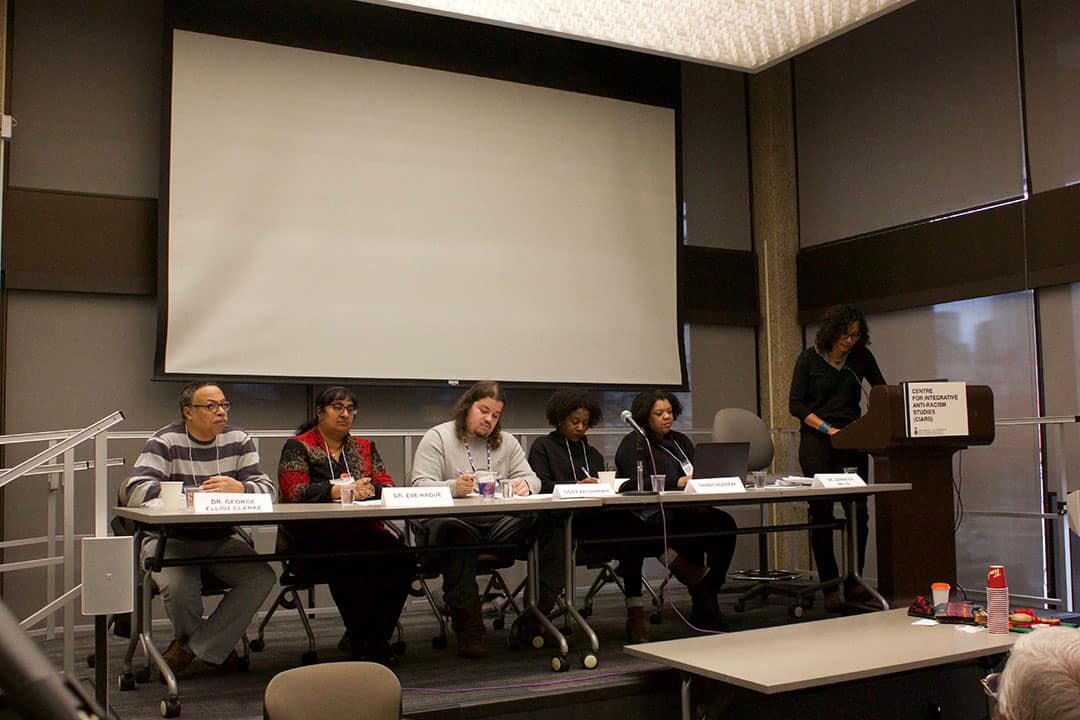Canada’s sesquicentennial anniversary, while widely celebrated, has also raised critical discussion regarding what it means to celebrate the past 150 years as seen through the lens of colonialism.
On November 11, the Centre for Integrative Anti-Racism Studies hosted a workshop and symposium event titled “150 for Whom, Canada? Colonialism and Indigeneity across Lands” at U of T’s Ontario Institute of Studies in Education.
The event included a panel discussion featuring Sandra Hudson, former University of Toronto Students’ Union (UTSU) Executive Director and co-founder of Black Lives Matter – Toronto; Coty Zachariah, current National Chairperson of the Canadian Federation of Students (CFS); George Elliott Clarke, former Poet Laureate of Toronto; Eve Haque, associate professor at York University; and Jennifer Mills, a postdoctoral researcher at York. The event was moderated by Alissa Trotz, an Associate Professor of Women and Gender Studies.
The discussion focused in large part on the ways that the panelists perceived Canada to have failed racialized and Indigenous communities, and how, as Hudson opined, Canadians should not be celebrating 150 years of conquest, violence, and settler colonialism.
“When I think about Canada 150, I’m thinking of 150 years of what?” she asked. “As a Black person, I don’t see myself reflected in anything about Canada 150 at all.”
The panelists also discussed the basis of Canada’s foundation, asking why Canadians are celebrating the past 150 years when the country’s history stretches far beyond that.
Zachariah, who is Afro-Indigenous, argued that the sesquicentennial celebrates the erasure of the history of Indigenous peoples who have been here much longer than European settlers. “When I think about 150 and 10,000, there’s just no comparison,” he said.
Clarke stated that it was also important to remember the original reason for Confederation, saying that “Canada is, in my opinion, the result of the British empire’s need to establish a bulwark against American manifest destiny, nothing more and nothing less than that.”
There was also discussion about the role of language in Canada’s history with Indigenous peoples.
Haque, who teaches in York’s Department of Languages, Literatures and Linguistics, spoke about the “importance of language” and how colonialism has destroyed parts of Indigenous culture.
“It is also through the imposition of colonial languages and the violent expunging of Indigenous languages and other languages that are here that colonialism is trying to break Indigenous relationship with land,” she said.
Zachariah echoed Haque’s point, saying, “They stole your language and your culture and they charge you $10,000 a year to get it back,” referring to the tuition some students might have to pay in order to learn Indigenous languages.
When asked by The Varsity how he plans to use his position as CFS National Chairperson to educate students on these issues, Zachariah said that it would be “by having this conversation, by being open to talking to places like The Varsity about what it means and what it could mean, and how we can form better relationships moving forward.” He said his role as chairperson can be to help foster those conversations.
He also said that he was “very open to working with any school,” including U of T, despite the UTSU’s current anti-CFS stance.
Hudson declined to comment.


